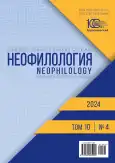Cybernetics in philology. Statement of the problem
- Authors: Ovtcharenko A.Y.1, Shaprinskay E.A.1
-
Affiliations:
- Peoples’ Friendship University of Russia named after Patrice Lumumba
- Issue: Vol 10, No 4 (2024)
- Pages: 879-888
- Section: THEORY OF LITERATURE
- URL: https://journal-vniispk.ru/2587-6953/article/view/295627
- DOI: https://doi.org/10.20310/2587-6953-2024-10-4-879-888
- ID: 295627
Cite item
Full Text
Abstract
INTRODUCTION. The relationship between cybernetics and philology is considered. The rapid development of modern technologies, and artificial intelligence in particular, poses the question of introducing programs focused on humanitarian and technological multidisciplinary approaches to higher education institutions to modern specialists, which, of course, is associated with many difficulties, including psychological ones. The purpose of the study is to consider and analyze the possible application of cybernetics and quantitative methods in philology.MATERIALS AND METHODS. The main part examines typical modern myths about neural networks and interactions with them by specialists in the field of humanities. One of the main methods of rationalizing unfounded fears of artificial intelligence is an explanation of the mechanism of its algorithms. Detailed comments are given on the prospects that are opened by the joint activities of philologists and programmers. In addition, the issue of introducing cybernetic principles into philological studies of poetry is considered. Thanks to this view of the problem, it will be possible to talk about the reconstruction of poems based on existing discrepancies using artificial intelligence.RESULTS AND DISCUSSION. The methodological and practical value of the integration of cybernetics and philology is touched upon, which makes it possible to speak about bringing humanitarian research to a new, “digital” level.CONCLUSION. It is emphasized that not only philologists need to acquire digital competencies, but it is also important for programmers to have knowledge in the field of language and culture, since further development of AI technologies is impossible without the integration of these two areas.
About the authors
A. Y. Ovtcharenko
Peoples’ Friendship University of Russia named after Patrice Lumumba
Email: ovtcharenko-1959@yandex.ru
ORCID iD: 0000-0002-8544-5812
Dr. Sci. (Philology), Associate Professor, Professor of Russian Language and Linguocultural Studies Department
6 Miklukho-Maklaya St., Moscow, 117198, Russian FederationE. A. Shaprinskay
Peoples’ Friendship University of Russia named after Patrice Lumumba
Author for correspondence.
Email: lizashapr@yandex.ru
ORCID iD: 0009-0004-6127-0116
Employee of the Scientific School “Linguocultural Studies and Professional Communication”
6 Miklukho-Maklaya St., Moscow, 117198, Russian FederationReferences
- Mamina R.I., Elkina E.E. Digital humanities: is it a new science or a set of models and practices of the global network project? Diskurs = Discourse, 2020, vol. 6, no. 4, pp. 22-38. (In Russ.) https://doi.org/10.32603/2412-8562-2020-6-4-22-38, https://elibrary.ru/wuooqy
- Yaroslavtseva E.I. Digital humanities: interdisciplinary strategies for the future. Gorizonty gumanitarnogo zna-niya = The Horizons of Humanitarian Knowledge, 2020, no. 2, pp. 3-29. (In Russ.) https://doi.org/10.17805/ggz.2020.2.1, https://elibrary.ru/suwqry
- Luhmann J., Burghardt M. Digital humanities – a discipline in its own right? An analysis of the role and position of digital humanities in the academic landscape. Journal of the Association for Information Science and Tech-nology, 2021, vol. 73, no. 2, pp. 148-171. https://doi.org/10.1002/asi.24533, https://elibrary.ru/mgvlyt
- Mayorova E.V. Digital classical philology: ancient Greek and Latin in the digital revolution. Sotsial’nye i guma-nitarnye nauki. Otechestvennaya i zarubezhnaya literatura. Seriya 6: Yazykoznanie = Social Sciences and Hu-manities. Domestic and Foreign Literature. Series 6: Linguistics, 2021, no. 1, pp. 68-81. (In Russ.) https://elibrary.ru/epzrjp
- Kizhner I., Terras M., Orekhov B., Manovich L., Kim I., Rumyantsev M., Bonch-Osmolovskaya A. The history and context of the digital humanities in Russia. Global Debates in the Digital Humanities, Minneapolis, Univer-sity of Minnesota Press Publ., 2022, art. 5, pp. 55-70. https://elibrary.ru/zjgotu
- Chernenkaya S.V. Digital humanities in the context of modern humanitarian knowledge. Vestnik MGPU. Seriya: Filosofskie nauki = MCU Journal of Philosophical Sciences, 2020, no. 2 (34), pp. 61-66. (In Russ.) https://doi.org/10.25688/2078-9238.2020.34.2.07, https://elibrary.ru/jmteav
- Severina E.M., Bonch-Osmolovskaya A.A., Bets Yu.V., Flyagina M.V. Digital projects in humanities: interdis-ciplinary practices. Gumanitarnye i sotsial’nye nauki = The Humanities and Social Sciences, 2021, no. 5, pp. 112-129. (In Russ.) https://doi.org/10.18522/2070-1403-2021-88-5-121-129, https://elibrary.ru/qbpkwi
- Lukov V.A., Lukov S.V. Digitization in Russian society: human dimension. Znanie. Ponimanie. Umenie = Knowledge. Understanding. Skill, 2020, no. 1, pp. 92-100. (In Russ.) https://doi.org/10.17805/zpu.2020.1.7, https://elibrary.ru/cqhybf
- Piotrowski M., Xanthos A. Unpacking the digital humanities. Humanités numériques, 2000, no. 1. (In French). https://doi.org/10.4000/revuehn.381
- Chebotareva E.E. Digital Humanities projects: attempt at a metadigital view. Epistemologiya i filosofiya nauki = Epistemology & Philosophy of Science, 2023, vol. 60, no. 2, pp. 224-240. (In Russ.) https://doi.org/10.5840/eps202360234, https://elib0rary.ru/pfxyua
- Shelya A., Plekhach P., Zelenkov Yu. The Batenkov phenomenon and the authorship verification problem: a multivariate statistical approach to an unresolved issue. Acta Slavica Estonica 12. Pushkinskie chteniya v Tartu = Acta Slavica Estonica 12th. Pushkin Readings in Tartu, 2020, issue 2, no. 6, pp. 131-165. (In Russ.)
- Pil’shchikov I.A., Ustinov A.B. Moscow linguistic circle and the formation of Russian poetry (1919–1920). Un-acknowledged Legislators: Studies in Russian Literary History and Poetics in Honor of Michael. Berlin, Peter Lang Publ., 2020, pp. 389-413. (In Russ.)
- Kazartsev E., Zemskova T. A new electronic system for comparative analysis of verse and prose. Sbornik po materialam ezhegodnoi Mezhdunarodnoi konferentsii «Dialog» «Komp’yuternaya lingvistika i intellek-tual’nye tekhnologii» = Proceeding of Papers from the Annual International Conference “Dialogue” “Computational Linguistics and Intellectual Technologies”. 2021, issue 20, pp. 378-384. https://doi.org/10.28995/2075-7182-2021-20-378-384, https://elibrary.ru/guzeyn
- Fomina N.V. Application of digital humanities for the analysis of English language variability (case study of TV series). Vestnik Voronezhskogo gosudarstvennogo universiteta. Seriya: Lingvistika i mezhkul’turnaya kommuni-katsiya = Proceedings of Voronezh State University. Series: Linguistics and Intercultural Communication, 2020, no. 2, pp. 75-85. (In Russ.) https://doi.org/10.17308/lic.2020.2/2843, https://elibrary.ru/dszdkk
- Severina E.M., Larionova M.Ch. New philological practices: semantic edition of A.P. Chekhov’s texts. Filolo-giya: nauchnye issledovaniya = Philology: Scientific Researches, 2020, no. 10, pp. 13-21. (In Russ.) https://doi.org/10.7256/2454-0749.2020.10.33970, https://elibrary.ru/rqevyc
Supplementary files









